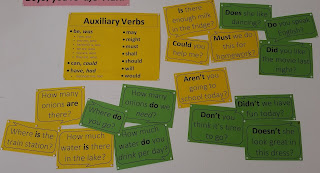Today's lesson was a lot better than the last one. Actually I thought it was incredible how well the class participated in this lesson today...
My weekend was "something else" and so I got up very early this morning and meant to get the new question chunks ready to put them on the wall but they only made it to the blackboard and I forgot to take a picture. So this will by in the blog next Friday...
But I did make it a lot easier. I printed the list of auxiliary words (without the "do") on a yellow paper and the possible questions with auxiliary verbs on yellow paper too. The questions with "to do" are all on green paper.
WHY WITHOUT THE DO? Well even though "to do" might be an auxiliary verb, I don't ask a question like "Did you your homework?" like I ask questions with auxiliary verbs. I would say "Did you do your homework?" so I use "to do" just like a regular verb. That's why I took it from the list.
So at the beginning of the lesson, I asked the kids to discuss in pairs what the difference was between the yellow side and the green side. Each group had to give me an answer. In English of course and I just had to remind them once ;-) not all answers were correct but I accepted any English answer with a thumb up. As all groups were through I gave them the correct explanation which most of them found out anyway.
Then I handed out the vocabulary cards to each child and we played the game we played last week again. So I thought of a word from my list (bottle) and they had to guess. They were really excited and quiet eager to find the solution. With my second word I told them, that they could use their own vocabulary cards. So if they asked me "can you eat it?" and I said "no, I can't" than they could put aside all the food cards. This way the kids activate many different neuro-mechanisms (like Vera F. Birkenbihl calls them - this will all be part of my theory part of this bachelor thesis)
The kids categorise their vocabulary words.
They give them a meaning.
They ask questions.
They get an immediate feedback.
They are curious about the words I think about.
They play...
And probably even more. So this way of looking at the vocabulary is (according to Vera F. Birkenbihl) highly "brain-friendly". And it was fun too!!! The kids loved it.
This time I even managed to give all the kids a thumbs up when they said something in English and they could raise their flag a little higher.
Then I put them in groups of three. One of them should chose a word from the word cards and the other two should guess by asking those questions. Me and the head teacher walked around the classroom and listened to the questions and answers. Every time we heard a correct question or a correct answer like "yes, it is." or "no, I don't" the kids could go one up. I stressed this form of answering because I didn't want them to just to say "yes" or "no".
After about two minutes we both realises that pretty much all questions started with "is it ...?" So I interrupted them and asked them for more possible ways to ask like "can I drink it?", "do you have it in the kitchen" and so one. After having heard a bunch of different questions I let them go on.
I have to admit I was almost floating through the classroom. 17 kid sat there being very excited, speaking only English, asking mostly perfect questions, and getting excited as their flag reached the top of the pole. Some of them even took it down to -7 and wanted to go all the way up again :-)
About five minutes before the end of the lesson, I interrupted them and played the hangman game with them at the blackboard. So I drew as many lines as there were letters in the word I thought of and the kids had to guess the letters. First we went trough the alphabet together
(I'll have to work on that too...) and then we played. They were allowed to look at the cards since I wanted them to think about their spelling.
So this really was a fun lesson and I'll definitely let them play these two games again.
